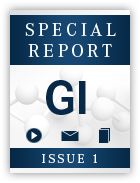TTP, OS Benefit Seen Following Treatment With TGF-β Inhibitor in HCC
Treatment with an inhibitor of TGF-β led to significant reductions in a prespecified biomarker that correlated with increased TTP and OS in patients with advanced HCC, according to results of a phase II clinical trial.
Micrograph of HCC
Treatment with an inhibitor of transforming growth factor-beta (TGF-β) led to significant reductions in a prespecified biomarker that correlated with increased time to progression (TTP) and overall survival (OS) in patients with advanced hepatocellular carcinoma (HCC), according to results of a phase II clinical trial.
Patients who met criteria for an alpha-fetoprotein (AFP) response had a median TTP exceeding 4 months and an OS approaching 2 years. In contrast, lack of AFP response was associated with median TTP and OS of one third to one fourth that of responders, according to Sandrine J. Faivre, MD, PhD, at the 2014 Gastrointestinal Cancers Symposium.
“Inhibition of TGF-β 1 receptor by LY2157299 was associated with pharmacodynamic effects, result in decreased AFP, decreased TGF-β 1, and [decreased] E-cadherin serum levels,” said Faivre, a medical oncologist at Hôpital Beaujon in Clichy, France. “Patients with an AFP biomarker response display longer time to progression and overall survival as compared with AFP nonresponders. Clinical evaluation of LY2157299 is continuing.”
Transforming growth factor-beta signaling is associated with progression in HCC and induction of epithelial-mesenchymal transition cells, cancer stem cells, and T-regulatory cells. Additionally, serum TGF-β levels are associated with high levels of AFP, and increased AFP expression correlates with stem cell biology and induction of T-regulatory cells in HCC.
Inhibition of TGF-β signaling in HCC has the potential to interfere with proliferation, invasion, metastasis, and migration/progression.
LY2157299 selectively inhibits TGF- β receptor 1 and has demonstrated antitumor activity in various models of HCC, according to Faivre. The kinase inhibitor has demonstrated a favorable toxicity profile in clinical studies involving patients with glioma.
Cumulatively, the preclinical and clinical data provided a rationale to evaluate LY2157299 in advanced HCC. A phase II trial was conducted to examine the activity of two doses of the TGF-β inhibitor in patients whose HCC had progressed on sorafenib or who were considered ineligible for sorafenib and elevated AFP (in a population enriched with activated TGF-β signaling).
The trial's primary endpoint was investigator-assessed TTP; effects of LY2157299 on AFP, TGF-β 1, and E-cadherin; and identification of a patient population that would derive the most benefit from treatment with LY2157299.
Investigators in the trial enrolled patients with Child-Pugh stage A or B7 HCC, AFP at least 1.5 times the upper limit of normal as assessed by a central laboratory, ECOG performance status of 1 or less, and progression on sorafenib (or ineligible for sorafenib).
Eligible patients were randomized to two doses of LY2157299 (160 mg or 300 mg/day). After a second prespecified interim analysis, investigators selected the higher dose for continued evaluation of LY2157299. Investigators treated a total of 109 patients, 72 of whom received the 300-mg/day dose.
Baseline characteristics of patients treated with the two doses did not differ with respect to hepatitis C (HCV) infection, HBV infection, nonalcoholic steatohepatitis, alcohol use, hemochromatosis, or prior sorafenib treatment.
Overall, LY2157299 was well tolerated: 7 patients treated with 160 mg/day had grade 3-4 adverse events versus 12 patients treated with the higher dose. Analysis of biomarker response data showed that a total of 24 patients met the definition of AFP response (>20% reduction from baseline). Additionally, 53% of patients had a greater than 20% reduction in TGF-β1, including 18 of the 25 patients who had AFP responses.
All treated patients, irrespective of dose, had a mean TTP of 2.8 months and OS of 8.3 months. A separate analysis of TTP and survival by dose of LY2157299 showed similar results.
Analysis of outcomes by AFP response showed that the 25 patients who had greater than 20% reduction from baseline had a median TTP of 4.3 months compared with 1.5 months for nonresponders. Median OS was 21.4 months with AFP response and 6.8 months without. Baseline AFP (at least 200 ng/mL or less than 200 ng/mL) did not influence TTP or OS.
Faivre S, Santoro A, Kelley RK, et al. A Phase 2 Study of Novel Transforming Growth Factor-beta (TGF-β) Receptor 1 Kinase Inhibitor, LY2157299 Monohydrate in Patients With Advanced Hepatocellular Carcinoma (HCC). Presented at: 2014 Gastrointestinal Cancers Symposium; January 16-18, 2014; San Francisco, CA.

Survivorship Care Promotes Evidence-Based Approaches for Quality of Life and Beyond
March 21st 2025Frank J. Penedo, PhD, explains the challenges of survivorship care for patients with cancer and how he implements programs to support patients’ emotional, physical, and practical needs.
Read More













